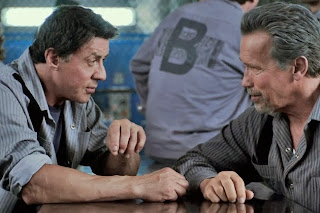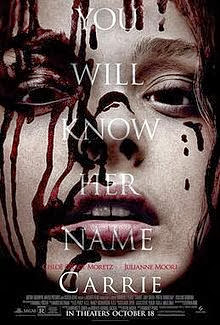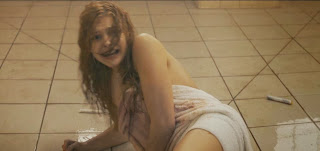SUDDENLY
(Canada - 2013)
Yes, this is indeed a remake of the cult classic 1954 presidential assassination thriller that was unseen for many years but is now a public domain staple. The original SUDDENLY was MIA from 1963 until the late 1980s after star Frank Sinatra erroneously believed that Lee Harvey Oswald had watched it on TV less than a month before the assassination of JFK and had the film pulled from circulation. SUDDENLY resurfaced around the same time as the Chairman resurrected another long-dormant film of his that dealt with politics and assassination--the much better-known THE MANCHURIAN CANDIDATE (1962). This Canadian-made remake doesn't bring much new to the table other than F-bombs, cell phones, a Barack Obama lookalike, and the unlikely Uwe Boll in the director's chair. SUDDENLY '13 finds Boll in rare hired-gun mode, working away from his usual producing partners and assorted enablers but bringing a few old and presumably financially-strapped pals along for the ride. Ray Liotta, somehow working with Boll again after 2008's IN THE NAME OF THE KING, stars as a booze-addled deputy sheriff who ends up in the middle of a plot to assassinate the President when his motorcade's drive through the small town of Suddenly is preceded by a team of shady, professional assassins disguised as Secret Service agents. They're led by Baron (ASSAULT ON WALL STREET's Dominic Purcell, Boll's current favorite actor, also in the upcoming IN THE NAME OF THE KING 3), a disgruntled Iraq War vet with a vendetta against the US government. Liotta's character is a vet as well, and has been wallowing in an alcoholic haze since he accidentally killed his war hero best friend. Liotta now pines for his buddy's widow (Erin Karpluk, also of ASSAULT ON WALL STREET) and is a dad of sorts to her troublemaking, Bieber-coiffed son (Cole Coker), who sports the improbable nickname "Pidge," which may have been quaint and nice and wholesome in 1954 but is just asking to be bullied in 2013.
As far as Boll joints go, SUDDENLY is, relatively speaking, one of the "better" ones. It's fairly straightforward and Boll avoids his tendency to poke people with sticks to get a reaction (the closest he comes to ruffling any feathers is presenting the president as "Obama-esque," though the actor looks like an Obama who might appear in a jokey local TV spot for a used car dealer). The problem is that even though Boll got to hang out with his friends (regulars like Michael Pare and Brendan Fletcher also turn up), he isn't really into the gig here. SUDDENLY is dull and slowly-paced, rarely suspenseful, and if it weren't for the profanity, it could easily be a TV-movie. Purcell fares a bit better here than in some of his other recent films, where he's little more than a lumbering lummox, but that sort of plays to his advantage in SUDDENLY. Liotta doesn't try any harder than he needs to, but he looks pretty convincing when his character is completely hammered. Whether he was going all Method as an excuse to cope with the trauma of once again finding himself on an Uwe Boll set is anyone's guess, but he looks legitimately shitfaced throughout. Bland and forgettable, SUDDENLY shows that, if nothing else, Boll can handle generic assignments if he ever chooses to quit making a bad-movie spectacle of himself. (Unrated, 90 mins)
BREAKOUT
(Canada - 2013)
Wasn't Brendan Fraser an A-lister just a few years ago? What happened? Was FURRY VENGEANCE that bad? Other than voicing the hero in the recent animated film ESCAPE FROM PLANET EARTH, his recent output is pretty dire: 2013 saw very limited theatrical runs for STAND OFF (shelved for two years) and the awful PAWN SHOP CHRONICLES, and now BREAKOUT has skipped theaters completely. BREAKOUT is written and directed by Canadian exploitation vet Damian Lee, who made 1989's FOOD OF THE GODS 2 and a bunch of DTV Jeff Wincott movies in the '90s. He worked sporadically in the '00s but has been busy the last few years with bigger actors in films that have been duds nonetheless (like A DARK TRUTH with Andy Garcia and Forest Whitaker), as they were still directed by Damian Lee. At this rate, it's only a matter of time before Fraser is hooking up with Uwe Boll, and they already have a mutual friend since busy Boll man-crush Dominic Purcell is conveniently onboard here. The idiotic BREAKOUT has fugitive Purcell on the run to Canada with his mentally-challenged brother (Ethan Suplee), when two kayaking teens (Holly Deveaux, Christian Martyn) witness Purcell killing a guy. The kids are on a camping trip with their dad's friend (Daniel Kash). Their dad is Fraser, an environmental activist who's been in prison for the last seven years after accidentally killing someone during a scuffle at a protest. Purcell kills Kash and pursues the kids through the woods. Meanwhile, their mom (Amy Price-Francis) visits Fraser to tell him what's going on, and Fraser is able to conveniently walk away from a work furlough cleaning up in the very woods where Purcell is maniacally hunting the kids. Fraser manages to quickly find the kids, proves to be a natural at operating a shotgun with one hand, and so begins a cat-and-mouse game with Purcell while the kind-hearted Suplee finds Deveaux's dropped cell phone and spends the rest of the film talking to Fraser's ex, convinced he's talking to his late mother.
It's mostly implausible nonsense with a really bad performance by Fraser, who does little more than yell "Run!,""Go!,""Gaaah!,""Aaaah!," and "Waaaah!" I've never been a huge Fraser fan but I never really had a problem with him. He was fine in his early roles like SCHOOL TIES and showed some range with GODS AND MONSTERS, and maybe it's that he's been bolstered by big budgets during that decade-or-so run in big event movies like THE MUMMY, but now, in his mid-40s, between this and PAWN SHOP CHRONICLES (I haven't seen STAND OFF), he's suddenly become an absolutely terrible actor. He's so bad here that he makes Purcell look OK, and both of them are upstaged by a surprisingly credible, sympathetic performance by Suplee, who's the only one of the three main actors who appears to be trying. Indifferently directed by Lee (check out the wrong placement of a "Seven years later" caption in the beginning; it's shown during the prologue, which is still taking place seven years before the main plot; was anyone paying attention?) and with little logic or suspense, BREAKOUT is probably a career-low for Fraser, who finds himself in the same boat as former '90s/'00s sure things Nicolas Cage and John Cusack. Did Fraser burn some bridges somewhere? Piss off the wrong studio exec? Did that Golden Globes spaz attack become a scarlet letter? Or is it just simply a slump that many actors experience? (R, 89 mins)
FRANKENSTEIN'S ARMY
(US/Czech Republic/The Netherlands - 2013)
There's two things that simply need to end, and end now, when it comes to the horror genre: 1) found-footage films, and 2) prefab hipster/horror scenester cult movies. FRANKENSTEIN'S ARMY gives us both in one dull, shrill, shrieking, headache-inducing, shaky-cam package. Earning generally positive reviews and currently sporting a baffling 71% on Rotten Tomatoes, FRANKENSTEIN'S ARMY is the kind of horror flick with a seemingly irresistible premise but the filmmakers don't know what do with any of it and make one ill-advised decision after another. Since they bungle the found-footage aspect in record time (and it makes no sense that stuff supposedly shot in the 1940s would look crisp and modern and be 16:9, but I digress), director Richard Raaphorst (the abandoned zombie film WORST CASE SCENARIO) and writers Chris W. Mitchell and Miguel Tejada-Flores might've been better off just making a straightforward, old-school horror movie without all the found-footage bullshit. All we get for nearly an hour are thickly-accented Russian soldiers (speaking English, of course) behind enemy lines, walking around and yelling at each other before they encounter an abandoned warehouse where one Viktor Frankenstein (Karel Roden) is carrying on the work of his famous grandfather. Soon, the soldiers are battling Frankenstein's "zombots"--steampunk-inspired creatures pieced together from body parts and machines. How difficult would it have been to make this a fun, freewheeling horror film? It tries to go for an anarchic, early Sam Raimi/Peter Jackson vibe but doesn't give its actors anything more to do other than run around and yell, practically turning the film into a combination of a video game and a door-slamming farce by the end. It's not scary, it's not funny, and it wastes an enthusiastic performance by veteran character actor Roden, who tries hard but isn't onscreen long enough to accomplish anything. Obviously, some people liked this but I found it excruciating. THE FRANKENSTEIN THEORY might actually be better. (R, 84 mins)
(Canada - 2013)
Yes, this is indeed a remake of the cult classic 1954 presidential assassination thriller that was unseen for many years but is now a public domain staple. The original SUDDENLY was MIA from 1963 until the late 1980s after star Frank Sinatra erroneously believed that Lee Harvey Oswald had watched it on TV less than a month before the assassination of JFK and had the film pulled from circulation. SUDDENLY resurfaced around the same time as the Chairman resurrected another long-dormant film of his that dealt with politics and assassination--the much better-known THE MANCHURIAN CANDIDATE (1962). This Canadian-made remake doesn't bring much new to the table other than F-bombs, cell phones, a Barack Obama lookalike, and the unlikely Uwe Boll in the director's chair. SUDDENLY '13 finds Boll in rare hired-gun mode, working away from his usual producing partners and assorted enablers but bringing a few old and presumably financially-strapped pals along for the ride. Ray Liotta, somehow working with Boll again after 2008's IN THE NAME OF THE KING, stars as a booze-addled deputy sheriff who ends up in the middle of a plot to assassinate the President when his motorcade's drive through the small town of Suddenly is preceded by a team of shady, professional assassins disguised as Secret Service agents. They're led by Baron (ASSAULT ON WALL STREET's Dominic Purcell, Boll's current favorite actor, also in the upcoming IN THE NAME OF THE KING 3), a disgruntled Iraq War vet with a vendetta against the US government. Liotta's character is a vet as well, and has been wallowing in an alcoholic haze since he accidentally killed his war hero best friend. Liotta now pines for his buddy's widow (Erin Karpluk, also of ASSAULT ON WALL STREET) and is a dad of sorts to her troublemaking, Bieber-coiffed son (Cole Coker), who sports the improbable nickname "Pidge," which may have been quaint and nice and wholesome in 1954 but is just asking to be bullied in 2013.
As far as Boll joints go, SUDDENLY is, relatively speaking, one of the "better" ones. It's fairly straightforward and Boll avoids his tendency to poke people with sticks to get a reaction (the closest he comes to ruffling any feathers is presenting the president as "Obama-esque," though the actor looks like an Obama who might appear in a jokey local TV spot for a used car dealer). The problem is that even though Boll got to hang out with his friends (regulars like Michael Pare and Brendan Fletcher also turn up), he isn't really into the gig here. SUDDENLY is dull and slowly-paced, rarely suspenseful, and if it weren't for the profanity, it could easily be a TV-movie. Purcell fares a bit better here than in some of his other recent films, where he's little more than a lumbering lummox, but that sort of plays to his advantage in SUDDENLY. Liotta doesn't try any harder than he needs to, but he looks pretty convincing when his character is completely hammered. Whether he was going all Method as an excuse to cope with the trauma of once again finding himself on an Uwe Boll set is anyone's guess, but he looks legitimately shitfaced throughout. Bland and forgettable, SUDDENLY shows that, if nothing else, Boll can handle generic assignments if he ever chooses to quit making a bad-movie spectacle of himself. (Unrated, 90 mins)
BREAKOUT
(Canada - 2013)
Wasn't Brendan Fraser an A-lister just a few years ago? What happened? Was FURRY VENGEANCE that bad? Other than voicing the hero in the recent animated film ESCAPE FROM PLANET EARTH, his recent output is pretty dire: 2013 saw very limited theatrical runs for STAND OFF (shelved for two years) and the awful PAWN SHOP CHRONICLES, and now BREAKOUT has skipped theaters completely. BREAKOUT is written and directed by Canadian exploitation vet Damian Lee, who made 1989's FOOD OF THE GODS 2 and a bunch of DTV Jeff Wincott movies in the '90s. He worked sporadically in the '00s but has been busy the last few years with bigger actors in films that have been duds nonetheless (like A DARK TRUTH with Andy Garcia and Forest Whitaker), as they were still directed by Damian Lee. At this rate, it's only a matter of time before Fraser is hooking up with Uwe Boll, and they already have a mutual friend since busy Boll man-crush Dominic Purcell is conveniently onboard here. The idiotic BREAKOUT has fugitive Purcell on the run to Canada with his mentally-challenged brother (Ethan Suplee), when two kayaking teens (Holly Deveaux, Christian Martyn) witness Purcell killing a guy. The kids are on a camping trip with their dad's friend (Daniel Kash). Their dad is Fraser, an environmental activist who's been in prison for the last seven years after accidentally killing someone during a scuffle at a protest. Purcell kills Kash and pursues the kids through the woods. Meanwhile, their mom (Amy Price-Francis) visits Fraser to tell him what's going on, and Fraser is able to conveniently walk away from a work furlough cleaning up in the very woods where Purcell is maniacally hunting the kids. Fraser manages to quickly find the kids, proves to be a natural at operating a shotgun with one hand, and so begins a cat-and-mouse game with Purcell while the kind-hearted Suplee finds Deveaux's dropped cell phone and spends the rest of the film talking to Fraser's ex, convinced he's talking to his late mother.
It's mostly implausible nonsense with a really bad performance by Fraser, who does little more than yell "Run!,""Go!,""Gaaah!,""Aaaah!," and "Waaaah!" I've never been a huge Fraser fan but I never really had a problem with him. He was fine in his early roles like SCHOOL TIES and showed some range with GODS AND MONSTERS, and maybe it's that he's been bolstered by big budgets during that decade-or-so run in big event movies like THE MUMMY, but now, in his mid-40s, between this and PAWN SHOP CHRONICLES (I haven't seen STAND OFF), he's suddenly become an absolutely terrible actor. He's so bad here that he makes Purcell look OK, and both of them are upstaged by a surprisingly credible, sympathetic performance by Suplee, who's the only one of the three main actors who appears to be trying. Indifferently directed by Lee (check out the wrong placement of a "Seven years later" caption in the beginning; it's shown during the prologue, which is still taking place seven years before the main plot; was anyone paying attention?) and with little logic or suspense, BREAKOUT is probably a career-low for Fraser, who finds himself in the same boat as former '90s/'00s sure things Nicolas Cage and John Cusack. Did Fraser burn some bridges somewhere? Piss off the wrong studio exec? Did that Golden Globes spaz attack become a scarlet letter? Or is it just simply a slump that many actors experience? (R, 89 mins)
FRANKENSTEIN'S ARMY
(US/Czech Republic/The Netherlands - 2013)
There's two things that simply need to end, and end now, when it comes to the horror genre: 1) found-footage films, and 2) prefab hipster/horror scenester cult movies. FRANKENSTEIN'S ARMY gives us both in one dull, shrill, shrieking, headache-inducing, shaky-cam package. Earning generally positive reviews and currently sporting a baffling 71% on Rotten Tomatoes, FRANKENSTEIN'S ARMY is the kind of horror flick with a seemingly irresistible premise but the filmmakers don't know what do with any of it and make one ill-advised decision after another. Since they bungle the found-footage aspect in record time (and it makes no sense that stuff supposedly shot in the 1940s would look crisp and modern and be 16:9, but I digress), director Richard Raaphorst (the abandoned zombie film WORST CASE SCENARIO) and writers Chris W. Mitchell and Miguel Tejada-Flores might've been better off just making a straightforward, old-school horror movie without all the found-footage bullshit. All we get for nearly an hour are thickly-accented Russian soldiers (speaking English, of course) behind enemy lines, walking around and yelling at each other before they encounter an abandoned warehouse where one Viktor Frankenstein (Karel Roden) is carrying on the work of his famous grandfather. Soon, the soldiers are battling Frankenstein's "zombots"--steampunk-inspired creatures pieced together from body parts and machines. How difficult would it have been to make this a fun, freewheeling horror film? It tries to go for an anarchic, early Sam Raimi/Peter Jackson vibe but doesn't give its actors anything more to do other than run around and yell, practically turning the film into a combination of a video game and a door-slamming farce by the end. It's not scary, it's not funny, and it wastes an enthusiastic performance by veteran character actor Roden, who tries hard but isn't onscreen long enough to accomplish anything. Obviously, some people liked this but I found it excruciating. THE FRANKENSTEIN THEORY might actually be better. (R, 84 mins)



















































































